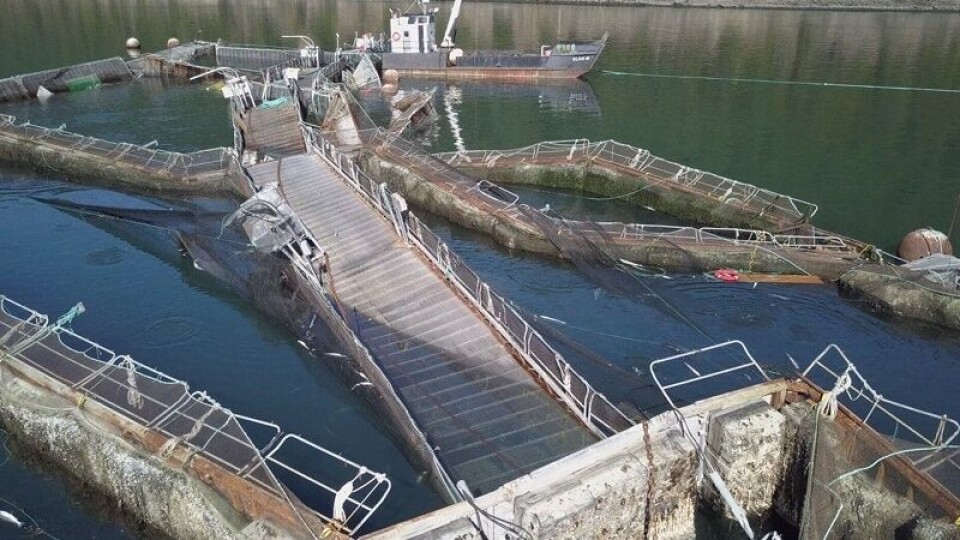
Cooke facing legal action over fish escape
A pressure group opposed to what it calls “the dangerous and reckless industry” of salmon farming has launched a legal action against Cooke Aquaculture following the escape of what now appears to be up to 250,000 fish from a farm in the United States.
Wild Fish Conservancy said it had submitted a letter to Cooke Aquaculture Pacific, LLC providing 60-day notice of intent to file a citizen suit under section 505 of the Clean Water Act following the incident in Washington State in the Pacific Northwest.
In a press release, WFC said: “Cooke Aquaculture presided over the near-complete structural failure of a net pen facility located in Deepwater Bay off of Cypress Island over the weekend of August 19 and 20, the failure of which has resulted in, and continues to result in, the discharge of farmed Atlantic salmon, dead fish carcasses, and massive amounts of debris among other pollutants.
'Blatantly negligent'
“These discharges represent blatantly negligent violations of the National Pollutant Discharge Elimination System (NPDES) permits under which Cooke Aquaculture’s Atlantic salmon net pens currently operate.
“Cooke Aquaculture has been quick to attribute the failure of their Cypress Island net pen to unusually high tides associated with the solar eclipse event that took place the morning of August 21. Wild Fish Conservancy takes several issues with this claim. The structural integrity of the Cypress Island net pen is reported to have displayed degradation resulting in unlawful discharge as early as August 19, a full two days prior to the solar eclipse event. Additionally, reporting suggests emergency maintenance was performed on Cypress Island net pens as far back as July 27, further calling into question the claim that high tides on August 21 were the cause of the net pen facility’s structural failure.”
Cooke’s “glaring negligence” has led to “an environmental disaster of epic proportion”, the pressure group said.
'Likely to compete'

“The escapement of Atlantic salmon poses threats of competition to native juvenile and adult salmon and steelhead,” said the Conservancy’s fisheries scientist Nick Gayeski. “The escaped fish still need to feed and thus are likely to compete with native juvenile Pacific salmon and steelhead, including preying on them.”
He added: “This dangerous and reckless industry not only threatens the recovery of our native salmon and orca populations, it threatens the health of Puget Sound and the Northwest's cultural identity.”
The Seattle Times reported that on Saturday the state government formed a multiagency response team to oversee and coordinate containment and recovery of the escaped fish.
Freeze on permits
“The release of net pen-raised Atlantic salmon into Washington’s waters has created an emergency situation,” governor Jay Inslee said in a news release.
Inslee and Commissioner of Public Lands Hilary Franz also said the state will not issue new leases or permits for net pens until a full review of the incident is completed.
The Seattle Times reported that Cooke also said on Saturday that it would not rebuild the collapsed pens, but would concentrate on recovering the salmon still remaining in the netted enclosures.
A fish-recovery vessel was pumping surviving Atlantic salmon from the pens into the vessel’s hold, said Chuck Brown, a spokesman for Cooke. A crane barge also was scheduled to lift containment nets to the surface to aid in fish removal, he said.
The company has said there were 305,000 fish in the pens that collapsed, but has not issued a firm count of the escaped fish.
First year as owners
On Saturday, Cooke employees recovered 62,100 fish from the net-pen cages, according to the company, in addition to the 5,166 fish recovered from the pens earlier in the week.
In a statement last week, Cooke said: “We are bringing the full weight of our global company’s technical knowledge and farming experience to assist the Cooke Aquaculture Pacific team.
“In our first year as owners of the Washington salmon farming operations, Cooke Aquaculture Pacific identified areas for investment to bring the facilities up to Cooke’s global standard. As part of that process, we applied for permits to allow us to strengthen and update the Cypress site even before the existing fish were harvested out. We will work with the relevant authorities to make sure we can employ the best knowledge, technology and the expertise of our global experts as we rebuild the farm.
“Cooke has a solid track record of investing in its operations following acquisitions. Examples from Maine, Scotland, Spain and Chile with the purchase of modern farming technologies, feeding systems and support vessels will serve as a model for Cooke’s investment in our Washington operations and in our people.”























































